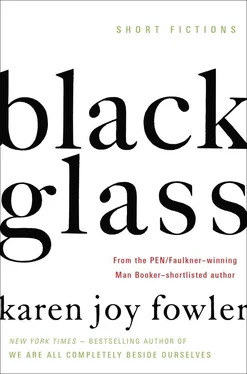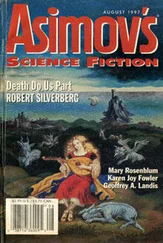Einstein set the letter back down into the snow. He had not yet found it. He had never had such a beautiful daughter. Perhaps he had not even met Mileva yet, Mileva whom he still loved, but who was not sound and who liked to play tricks.
Perhaps, he thought, he will find the letter in the spring when the snow melts. If the ink has not run, if he can still read it, then he will decide what to do. Then he will have to decide. It began to snow again. Einstein went back into his room for his umbrella. The snow covered the letter. He could not even see the letter under the snow when he stepped over it on his way to the bakery. He did not want to go home where no letter was hidden by the door. He was twenty-two years old and he stood outside the bakery, eating his bread, reading a book in the tiny world he had made under his umbrella in the snow.
Several years later, after Einstein has married Mileva and neither ever mentions Lieserl, after they have had two sons, a colleague will describe a visit to Einstein’s apartment. The door will be open so that the newly washed floor can dry. Mileva will be hanging dripping laundry in the hall. Einstein will rock a baby’s bassinet with one hand and hold a book open with the other. The stove will smoke. How does he bear it? the colleague will ask in a letter which still survives, a letter anyone can read. That genius. How can he bear it?
The answer is that he could not. He will try for many years and then Einstein will leave Mileva and his sons, sending back to them the money he wins along with the Nobel Prize.
When the afternoon post came, the postman had found the letter again and included it with the new mail. So there were two letters, only one had been already opened.
• • •
EINSTEIN PUT the new letter aside. He put it under his papers. He hid it in his bookcase. He retrieved it and opened it clumsily because his hands were shaking. He had known this letter was coming, known it perhaps with Lieserl’s first tooth, certainly with her first dance. It was exactly what he had expected, worse than he could have imagined. She is as bald as ice and as mad as a goddess, my Albert, Mileva wrote. But she is still my Lieber Dockerl, my little doll. She clings to me, crying if I must leave her for a minute. Mama, Mama! Such madness in her eyes and her mouth. She is toothless and soils herself. She is my baby. And yours, Schatzerl. Nowhere is there a boy I could love like my Papa, she says, lisping again just the way she did when she was little. She has left a message for you. It is a message from the dead. You will get what you really want, Papa, she said. I have gone to get it for you. Remember that it comes from me. She was weeping and biting her hands until they bled. Her eyes were white with madness. She said something else. The brighter the light, the more shadows, my Papa, she said. My darling Papa. My poor Papa. You will see.
The room was too small. Einstein went outside where his breath rose in a cloud from his mouth, tangible, as if he were breathing on glass. He imagined writing on the surface of a mirror, drawing one of his gedanken with his finger into his own breath. He imagined a valentine. Lieserl, he wrote across it. He loved Lieserl. He cut the word in half, down the s , with the stroke of his nail. The two halves of the heart opened and closed, beating against each other, faster and faster, like wings, until they split apart and vanished from his mind.
I wish you could see me now. You would laugh. I have a husband. I have children. Yes. I drive a station wagon. I would laugh, too. Our turn to be the big kids, the grown-ups. Our turn to be over thirty. It astonishes me whenever I stop and think about it. It has to be a joke.
I miss you. I’ve always missed you. I want us to understand each other. I want to tell you what I did after you left. I want to tell you what I did during the war. Most of all, I want to tell you the truth. This is what makes it so difficult. I have learned to distrust words, even my own. Words can be made to say anything. I know this. Do you?
Much of what I will tell you actually happened. You will be able to identify these parts, or you can ask me. This does not mean, of course, that any of it is true. Even among the people who were there with me are some who remember it differently. Gretchen said something once that echoed my own feelings. “We were happy, weren’t we?” she said. “In spite of everything. We made each other happy. Ill-advised, really, this putting your happiness into other people’s hands. I’ve tried it several times since, and it’s never worked again.”
But when I repeated this to Julie she was amazed. “Happy?” she asked. “How can you say that? I was so fat. I was being screwed by that teaching assistant. And ‘screwed’ is the only word that applies. There was a war. Don’t you remember?”
Can I tell you what I remember about the war? I remember the words. Vietnam was the language we spoke — secret bombing, the lottery, Vietnamization, self-immolation, Ho-Ho-Ho Chi Minh, peace with honor, peace at any price, peace, peace, peace. Somewhere, I imagine, on the other side of the world, these words meant something. Somewhere they had physical counterparts. Except for the last set, of course. If peace has ever had a physical value anywhere, none of us has been able to find it. But the other words corresponded to something. There was a real war going on, and in many ways we were untouched by it. This is what I’m trying to say: If the words alone were powerful enough to shape us and our lives as they did, what kind of an impact must the real war have had on its people?
I remember sitting on our sofa watching television. Julie is on the floor at my feet. She’s the red-haired Jewish one. She’s studying set design and is busy gluing together a tiny throne, part of a mock-up for the set of Saint Joan . “Women have fought in wars before,” she reminds us, “but only when God tells them to.”
Lauren is next to me. She’s black, light-skinned, and freckled. Her dog is on her lap, giving the television the same studied attention the rest of us are. Gretchen is standing in the doorway to the kitchen drinking a diet soda. She has short brown hair and heavy bangs, a white Catholic though not a practicing one. She clings to Catholicism because it protects her from being a WASP. This unpleasant designation is applicable only to me. You know me. I’m the plain white one on the end there with my legs drawn up to my chest and my arms around them. And that ten-inch figure on the screen with his hands in motion before him and the map of Cambodia behind him, that’s President Nixon. The Quaker. He is busy redrawing the Cambodian border and explaining to us that we are not really invading Cambodia, because the border is not where we have always thought it was. Gretchen swallows the last of her soda. “My God,” she says. “The man may be right. Just now, just out of the corner of my eye, I saw the border jump.”
Nixon is impervious to our criticism. He is content; he feels it is enough merely to have found something to say. I am twenty years old. I believe nothing I hear.
I was not always like that. Here is an earlier memory. We are standing on my parents’ front porch and you have your arms around me. You have driven all the way down from San Francisco to tell me you have been drafted. I find this incomprehensible. I know you could have avoided it. Isn’t Allen in Manhattan Beach, getting braces put on his teeth? Hasn’t Greg moved three times in three months, burying his induction notice in the U.S. mails? Hasn’t Jim joined VISTA, taking advantage of the unspoken agreement that if you are reluctant to burn villages and bomb children, your country will accept two years of urban volunteerism instead?
Читать дальше












